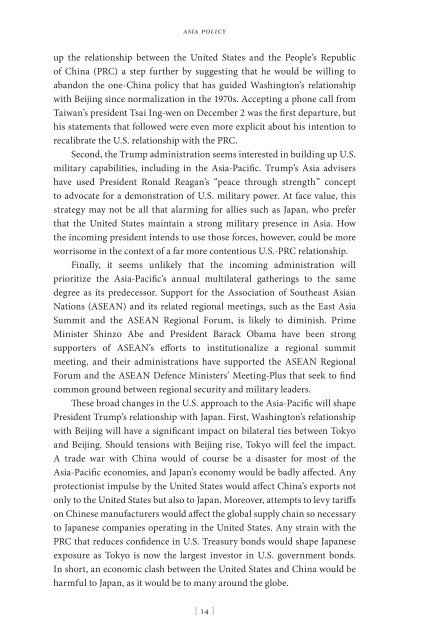2jBVKVf
2jBVKVf
2jBVKVf
Create successful ePaper yourself
Turn your PDF publications into a flip-book with our unique Google optimized e-Paper software.
asia policy<br />
up the relationship between the United States and the People’s Republic<br />
of China (PRC) a step further by suggesting that he would be willing to<br />
abandon the one-China policy that has guided Washington’s relationship<br />
with Beijing since normalization in the 1970s. Accepting a phone call from<br />
Taiwan’s president Tsai Ing-wen on December 2 was the first departure, but<br />
his statements that followed were even more explicit about his intention to<br />
recalibrate the U.S. relationship with the PRC.<br />
Second, the Trump administration seems interested in building up U.S.<br />
military capabilities, including in the Asia-Pacific. Trump’s Asia advisers<br />
have used President Ronald Reagan’s “peace through strength” concept<br />
to advocate for a demonstration of U.S. military power. At face value, this<br />
strategy may not be all that alarming for allies such as Japan, who prefer<br />
that the United States maintain a strong military presence in Asia. How<br />
the incoming president intends to use those forces, however, could be more<br />
worrisome in the context of a far more contentious U.S.-PRC relationship.<br />
Finally, it seems unlikely that the incoming administration will<br />
prioritize the Asia-Pacific’s annual multilateral gatherings to the same<br />
degree as its predecessor. Support for the Association of Southeast Asian<br />
Nations (ASEAN) and its related regional meetings, such as the East Asia<br />
Summit and the ASEAN Regional Forum, is likely to diminish. Prime<br />
Minister Shinzo Abe and President Barack Obama have been strong<br />
supporters of ASEAN’s efforts to institutionalize a regional summit<br />
meeting, and their administrations have supported the ASEAN Regional<br />
Forum and the ASEAN Defence Ministers’ Meeting-Plus that seek to find<br />
common ground between regional security and military leaders.<br />
These broad changes in the U.S. approach to the Asia-Pacific will shape<br />
President Trump’s relationship with Japan. First, Washington’s relationship<br />
with Beijing will have a significant impact on bilateral ties between Tokyo<br />
and Beijing. Should tensions with Beijing rise, Tokyo will feel the impact.<br />
A trade war with China would of course be a disaster for most of the<br />
Asia-Pacific economies, and Japan’s economy would be badly affected. Any<br />
protectionist impulse by the United States would affect China’s exports not<br />
only to the United States but also to Japan. Moreover, attempts to levy tariffs<br />
on Chinese manufacturers would affect the global supply chain so necessary<br />
to Japanese companies operating in the United States. Any strain with the<br />
PRC that reduces confidence in U.S. Treasury bonds would shape Japanese<br />
exposure as Tokyo is now the largest investor in U.S. government bonds.<br />
In short, an economic clash between the United States and China would be<br />
harmful to Japan, as it would be to many around the globe.<br />
[ 14 ]


